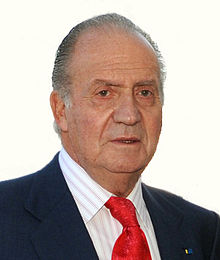

(Photo: Wikipedia)
SAN DIEGO — Many Americans probably yawned when they saw the news that Spain’s King Juan Carlos decided to abdicate the throne in favor of his son, Prince Felipe. But they should have been in awe of the King’s name. He’s a historical figure who displayed guts despite personal danger in helping modern-day Spain become a democracy. The reign in Spain has been anything but plain.
And even when it came to centuries of Spanish history Juan Carlos showed g-u-t-s. He tried to right centuries of wrong, as The Jewish Daily Forward’s Forward Thinking blog notes:
To many Sephardic Jews, the king was not only a symbol of Spain’s resurgent democracy, but of the country’s efforts to atone for the anti-Jewish sins of its past, however ham-fisted some of those efforts turned out to be.
It’s safe to say that, from a Sephardic perspective, Juan Carlos was the best Spanish king in over half a millennium. An heir to the throne of Queen Isabella and King Ferdinand, who expelled Spain’s Jews in 1492, Juan Carlos asserted that their descendants remained a part of Spain. In 1992, the king attended a ceremony at Madrid’s main synagogue, a symbolically weighty moment in a country that actively persecuted hidden Jews for centuries.
Juan Carlos set the stage, and created the climate. And last week, as the AP reported, Spain’s cabinet “approved a bill allowing descendants of Jews forced into exile centuries ago the right to dual citizenship, but said applicants will have to take a Spanish culture test in addition to having their ancient ties to the nation vetted by experts.” How much impact can one man have? A lot.
On two key occasions, Juan Carlos Alfonso Victor Maria de Borbon y Borbon-Dos Sicilias championed the democracy Spain has today. He didn’t brag about it. He just did it. The story starts with Spain’s late dictator Francisco Franco, who, as Saturday Night Live used to say, is still dead.
Although many Americans probably think Franco was the guy who canned spaghetti, in the 1920s he was Europe’s youngest general. He fused monarchist, right-wing and fascist support to defeat the Spanish Republic in the 1936-1939 Spanish Civil War, which cost one million lives. He installed himself dictator in a totalitarian state with all the repressive bells and whistles. He seemed to be a natural World War II ally of Germany’s Adolf Hitler and Italy’s Benito Mussolini’s, but refused to be bullied and shrewdly kept his country from being sucked into it. Hitler reportedly said he’d rather have four teeth pulled out than to meet again with Franco.
In 1969, Franco named Juan Carlos the next Spanish head of state. But it was clear Franco intended the REAL head of state would be his best bud, Admiral Luis Carrero Blanco, who he named Prime Minister in June 1973. Six months later, Blanco died when the Basque separatist group ETA set off explosives under his Dodge Dart as he returned from church, sending the car 66 feet into the air.
I arrived in Spain in May 1975, and was the Chicago Daily News’ stringer in Madrid. After Franco died in November 1975, I became The Christian Science Monitor’s Special Correspondent (super stringer). The popular joke then was about Blanco arriving at the gate and saying to St. Peter. “I’m Luis Carerro Blanco.” St. Peter replies: “It’s OK if you’re here — but did you HAVE to bring your car?”
Once Franco died, the country’s left and most younger Spaniards demanded Francoism’s end and clamored to be part of Europe. Many rightists demanded the status quo. The Basque separatist ETA continued its violent campaigns. Pro-democracy journalists were sometimes grabbed off the street and beaten brutally by ultra-right thugs who many insisted were pro-Franco paramilitary. Editors and diplomats privately told me they knew Juan Carlos wanted to move Spain to democracy and was quietly in contact with the country’s democratic forces and leaders. But many thought he’d fail.
Juan Carlos appointed a series of Prime Ministers who advocated “evolution without revolution” but The Real Deal emerged when he appointed technocrat Adolfo Suarez in July 1976. Suarez moved swiftly to enact reforms to help transform Spain into a bona fide democracy and, in 1977, became Spain’s first democratically elected Prime Minister since the civil war. One year later Spain’s voters approved the country’s first democratic constitution.
But danger remained: in 1981 some Army officers tried staging a coup. Juan Carlos is credited with having squelched it by going on TV in his army uniform, calling for the democratic government’s continuation and making it clear to the military where he stood. He had definitively proven his democratic creds.
In recent years, a series of scandals blemished the royal family, including a politically dumb hunting trip by the King to Botswana at a time when Spaniards were suffering due to the economy. In deciding to step down, Juan Carlos again showed himself politically astute: his son Prince Felipe enjoys a 77 percent approval rating.
Polls also show Spaniards want to vote on the monarchy at some point. Could they vote to scrap it? Perhaps.
But I’m betting not. Felipe will put a fresh face on a monarchy that helped Spain get democracy, helped Spain keep democracy, a monarchy epitomized by the man who showed more courage than most monarchs — or elected politicians — have ever shown.
*
Joe Gandelman is a syndicated columnist for Cagle Cartoons, the editor of The Moderate Voice blog and an entertainer who performs locally and nationally. This article appeared initially on The Moderate Voice.